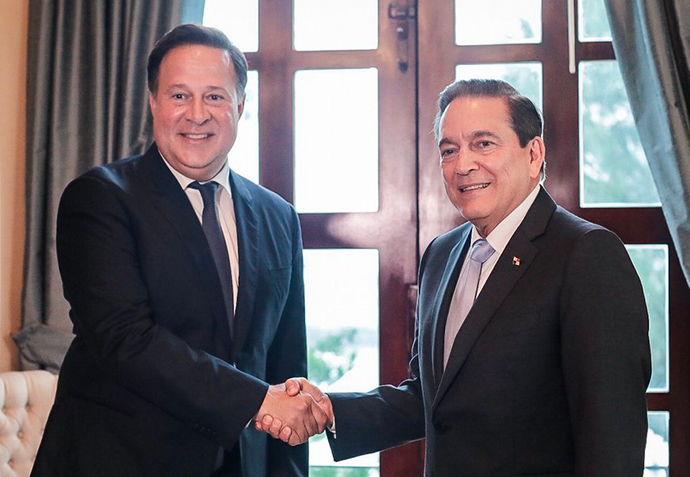Juan Carlos Varela and Nito Cortizo. Photo from Cortizo’s Twitter feed.
Where’s Nito going? Seguro Social, the Panama Canal and Venezuela
by Marco A. Ganásegui, hijo
When Laurentino Cortizo was proclaimed president-elect, he reiterated in his speech his intention to stick to a neo-liberal government program, similar to all governments following the US military invasion in 1989. It means more privatizations, greater flexibility in worker-employer relations, and deregulation of public functions public-private initiatives’).
In the field of foreign policy at one moment in the campaign he mentioned his intention to review the free trade treaty with the United States, especially in reference to the section on agriculture. Moreover, he indicated the possibility of respecting the right of self-determination for people who are in a confrontation with the USA.
There are indications from te Cortizo and PRD camps that these two proposals will be difficult to carry out. He appointed his vice-president-elect, Juan Gabriel Carrizo, a young businessman who was his private assistant, to head the transition team with the outgoing president. The composition of that team, and the upcoming appointments to the future cabinet, will define more clearly the direction that the new president will take starting July 1, 2019.
The political parties that ran against Cortizo in the recent elections have not commented on the president-elect’s plans. All of them appear to be deeply involved in internal reconstruction tasks on their respective houses. Outgoing ruling party, the Panameñistas, will convene a special convention to restructure the organization’s leadership. Cambio Democratico (CD), is concerned about the unfolding trial of former President Ricardo Martinelli. The Broad Front for Democracy (FAD) is analyzing its unfavorable election results.
In a meeting held by the Panamanian unions the problem of the Social Security Fund (CSS) was raised, which for years has been poorly managed and, according to its directors, is in a financial situation close to bankruptcy. A union spokesman pointed out that the CSS has to return to the solidarity system that governed until the 2005 pension system changes.
President-elect Cortizo mentioned social security as one of his government priorities. However, his approach does not seem to match that of the workers. Cortizo met with the outgoing president, Juan Carlos Varela, to begin the transfer of power. Before leaving Varela wants the Assembly to approve the appointments of a magistrate in the Supreme Court of Justice and a director in the Panama Canal Authority (ACP). It will be very difficult for that to happen given the correlation of party forces in the legislature.
The Panama Canal was one of the issues that was not discussed during the election campaign. Since 1994 when the economic powers that be agreed to introduce a constitutional amendment on the canal, the issue has been out of bounds. Only the protests of the workers and the corruption scandals on the board of directors are considered newsworthy. However, recent statements by US Secretary of State Mike Pompeo about the melting of the Arctic and the opening of new routes connecting East Asia with the markets of the North Atlantic should attract the attention of the new ruler. The announcement highlights the need to create a scientific commission to thoroughly study global warming and its impact on the Panama Canal’s commercial future.
It must be clear that the interoceanic route can’t be discussed with the United States. On many occasions — and its current administration has been forceful — Washington has said that its national interests are not to be negotiated. In the 1970s, however, Panama managed to put the waterway’s transfer on the US agenda, along with the evacuation of its military bases and the end of the Canal Zone. We must demand that Pompeo first consult with Panama before making statements about the future of maritime trade between the Pacific and the Atlantic.
Cortizo referred to Venezuela and mentioned the creation of something similar to the Contadora Group, which was created by General Torrijos to deal with the conflict in Nicaragua in the 1970s. The initiative would not be for a ‘regime change’ that Trump wants, but to find a solution to the conflict. The proposal would replace the United States (via the OAS and the Lima group) as a central actor in a war against Venezuela and would put Latin America in a central role in the solution to the conflict.
These links are interactive — click on the boxes













